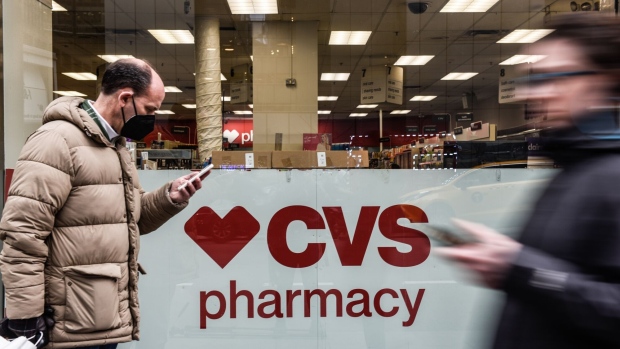May 3, 2023
CVS Cuts Earnings Outlook on Health-Care Acquisition Costs
, Bloomberg News

(Bloomberg) -- CVS Health Corp.’s shares fell after the drug-store chain cut its earnings forecast for the year in order to pay for two major acquisitions that are central to its strategy of moving beyond retail into becoming a health-care provider as well.
Adjusted profit for 2023 will be $8.50 to $8.70 a share, Woonsocket, Rhode Island-based CVS said Wednesday in a statement, a decrease of 20 cents from its earlier view. The company cited costs for acquiring home health-care provider Signify Health, and for its deal for primary care company Oak Street Health that closed Tuesday. CVS now faces the challenge of integrating Oak Street and Signify.
As traditional retail pharmacy has grown more competitive, giant drug-store and retail chains have been looking to other forms of health care to find ways to grow. Rival Walgreens Boots Alliance Inc. has been adding primary care centers to some of its US locations.
The shares fell 2.6% at 10:17 a.m. in New York.
CVS’s adjusted earnings for the quarter were $2.20 a share, beating the $2.09 average estimate of analysts surveyed by Bloomberg. Revenue rose 11% from a year ago to $85.3 billion, beating estimates of $80.9 billion.
CVS is also changing how it reports earnings by creating two new segments that will replace the retail/long-term care and pharmacy services units. The first, health services, will include health-care companies like Oak Street and Signify. The other segment, pharmacy and consumer wellness, includes current businesses such as the traditional retail pharmacy, specialty pharmacy, mail-order pharmacy and non-pharmacy offerings. The health-care benefits segment that contains the Aetna insurance business will remain the same.
Providers like Oak Street, a chain of clinics that serves patients on Medicare Advantage, are facing tighter reimbursements in 2024 than they expected. The government is also scrutinizing how they report patient diagnoses, which could impact the amount that companies like Oak Street are paid for their services.
Chief Executive Officer Karen Lynch said on a call with analysts that Oak Street is well-positioned to adjust to the recent changes.
“We took a long, hard look at Oak Street and their ability to adapt,” Lynch said. “The one thing that we were most impressed by was the level of commitment that they have relative to their patient care. And secondly, the technology platform that they have.”
Executives on the call said that they remain committed to achieving the target of adjusted earnings per share of about $9 in 2024 and $10 in 2025. “We take these commitments seriously and have aligned the organization and our operations to achieve these goals,” Shawn Guertin, CVS’s chief financial officer, said.
Rising Sales
The pharmacy and consumer wellness segment saw growth from increased prescription and nonpharmacy sales, brand inflation and other factors. Sales totaled $27.9 billion in the first quarter, easily beating estimates of $26.4 billion.
Revenue in the health-services segment, the company’s largest, rose 12.6% to $44.6 billion from a year ago, helped by more pharmacy claims and demand for specialty pharmacy.
The health-insurance unit beat estimates with quarterly sales of $25.8 billion, a 12.1% increase from the year earlier, which CVS said was due to growth across all product lines. The unit’s medical benefit ratio rose to 84.6%, signaling that the company spent more of its premium dollars on patient care.
--With assistance from John Tozzi.
(Updates with shares, and comments from company executives from paragraph eight)
©2023 Bloomberg L.P.


